The Bled Strategic Forum (BSF) and partners, having convened from 29-30 August 2022, urge the 2023 UN Water Conference co-hosts and organizers to reinforce the linkages between water and peace, and thereby enable a more habitable, peaceful planet for future generations.
Gathering five years after the launch of the 2017 Report of the Global High-Level Panel on Water and Peace, A Matter of Survival, we remain concerned that the Report’s powerful call for water to be recognized as a “fundamental condition of human survival and dignity”, and “the basis for the resilience of society and of the natural environment” – has gone largely unheeded. This presents a grave threat to the stability of societies and of our planet, which face increasingly precarious and unpredictable water-related events.
In recent decades, climate change, drought conditions, and governance failures have exacerbated challenges to water access and affordability, leading to an alarming rise in water-related conflicts. Today, none of the world’s conflict-affected nations are on track to meet the Sustainable Development Goals (SDGs), including on clean water and sanitation. At least 48 water-related conflicts rage globally[1], causing immense human suffering and further undermining social and economic progress for communities.
This year, the devastating droughts in southern Europe and parts of China, record-breaking heatwaves on the Indian subcontinent, and disastrous floods in Pakistan are simply the latest reminders of the fragility of our water systems and societies’ interdependence on them and on one other.
We therefore call upon the Kingdom of the Netherlands, Republic of Tajikistan, and the United Nations as co-hosts of the UN Water Conference in particular to:
- Acknowledge the interconnections and inter-dependencies of the global water system, and the fact that actions in one place will have consequences in another;
- Acknowledge the potential of water cooperation as a catalyst for peace, and of peacebuilding actions in advancing SDG 6 on access to safe, clean water;
- Reflect the convergence of water and peace as a thematic priority at the 2023 UN Water Conference;
- Involve stakeholders in interdisciplinary discussions about the interlinkages between peace and water in the lead up to the Conference.
One unquestionable truth from the 2017 report prevails - there is no substitute for water. New forms of governance, partnership, and decision-making are required to adapt and respond to these threats and changing realities. Just as inclusive and participatory water resource management can yield peace dividends, diplomatic efforts to broker peace can enhance access to safe and clean water in conflict-affected societies. With global freshwater supplies acutely under threat, we can no longer afford to tackle issues of water and of peace in siloes.
The Ministry of Foreign Affairs of the Republic of Slovenia endorses this statement.
[1] Climate Diplomacy Initiative's Conflict Factbook: www.climatediplomacy.org
Rehabilitating and reintegrating prisoners remains a struggle in many countries and communities around the world, including Rwanda. In recent years, many Rwandan prisoners, especially those convicted of crimes related to the 1994 genocide against the Tutsi, have finished their terms and returned to their communities. Most individuals convicted of the most heinous genocide-related crimes and sentenced to between 20 and 30 years in jail are expected to be released within the next four to five years. According to Rwanda Correctional Service (RCS) statistics, this number exceeds 20,000 people.
RCS has made remarkable efforts over the past several decades to improve the well-being of convicts, including the implementation of numerous rehabilitation and reintegration programmes. However, serious issues persisted. For instance, there was a lack of a national curriculum, particularly regarding the psychosocial preparation of soon-to-be-released inmates, as well as a strong coordination structure between the many actors involved in the rehabilitation process.
On July 20, 2022, RCS and Interpeace launched a comprehensive curriculum which is a 6-month certificate programme divided into eight key modules and each module focuses on the different themes. Those modules include interpersonal skills and conflict management; physical and mental wellness; career development and entrepreneurship; drug and substances abuse education; human rights and legal awareness; family dynamics; civic education and genocide ideology, and safe return and connection with family and society. It will be implemented in all 13 prisons across the country by RCS staff members in collaboration with RCS stakeholders. The curriculum was developed with technical assistance from Interpeace as part of the European Union-funded programme "Reinforcing community capacity for social cohesion and reconciliation through Societal Trauma Healing in Bugesera District." It will serve as guiding tool to correctional officers and partners to ensure effective psychosocial rehabilitation and reintegration of inmates into their families and communities.
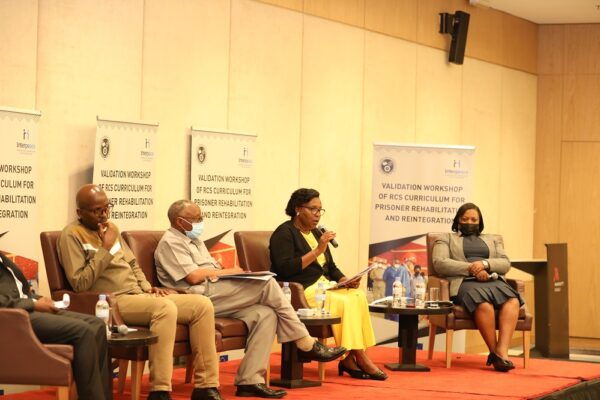
Studies have indicated that without an appropriate psychosocial rehabilitation and reintegration programme, released convicts may continue to experience feelings of humiliation, worthlessness, guilt, sadness, and a skewed self-image, all of which may impact their social lives in the community. In most cases, ex-prisoners face rejection by their families and communities, especially by community members who are not ready to receive them due to their crimes. The dismissal and lack of community support drive some to relocate to other places where they are not known. This may exacerbate social tensions by triggering fear and anxiety, particularly among genocide survivors.
According to the baseline research conducted prior to the development of this curriculum, the existing programmes are predominantly informal and not uniformly implemented in all prisons. They are provided by a range of non-governmental organisations (NGOs) and some governmental institutions rather than by RCS employed staff. The new curriculum consolidates and harmonizes existing initiatives and programmes and incorporates elements of relevant good practices identified from other contexts.
Frank Kayitare, the Country Representative of Interpeace in Rwanda, indicated that the research revealed the urgency of having a harmonized approach to prisoner rehabilitation and reintegration as part of trauma healing in the country.
"Re-integrating ex-prisoners for genocide-related crimes ranked among the highest challenges identified by families and communities in the survey. Difficulties for ex-prisoners and their immediate families to sufficiently reconnect, worsening anxiety among genocide survivors in the communities where these ex-genocide perpetrators are reintegrated; and the challenge of ex-prisoners adapting to a fundamentally changed society in many respects, including gender norms and family dynamics, are among the main issues that this curriculum is intended to help contribute to solve," said Kayitare.
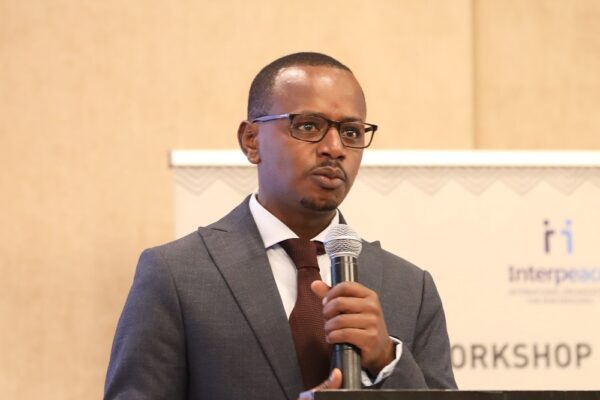
The new curriculum combines and harmonizes existing initiatives and programmes with elements of relevant good practices identified in other contexts. It has also considered the psychological aspect of prisoner rehabilitation, which was lacking in existing initiatives. As a result, it will not only equip inmates with socio-emotional skills such as self-management and dealing with trauma stemming from a long life in prison, but also develop vocational and livelihood skills to make an independent living in the community after release.
During the curriculum’s validation, the Commissioner General of RCS, ACP Alex Bahizi Kimenyi, recognized the added value of the curriculum as it offers a well-structured and holistic approach to tackling challenges his institution has been facing on this matter. He called upon all actors to lend their hand in ensuring effective and efficient curriculum implementation.
"This curriculum will enable us to work in a well-harmonized and coordinated manner, which will improve the quality of our work. However, adopting this curriculum is not the end of the journey; it is rather the beginning. I call upon all our partners, including donors, government institutions, and communities, to support this initiative so its implementation can be fully effective."
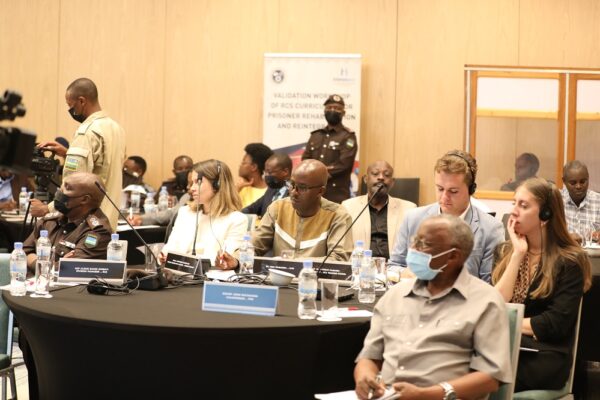
Thibaut Moyer, Head of Cooperation at the Delegation of the EU to Rwanda, appreciates the partnership with Interpeace that has led to the development of this curriculum. He reiterates the EU’s commitment to support its effective implementation.
"With the anticipated tens of thousands of prisoners to be released in the upcoming years, the EU has set aside 7 million Euros that will be used to work with local organizations, the government and other stakeholders to ensure a peaceful transition back into the communities for these prisoners and continue to foster peace in Rwanda."
The curriculum will contribute content to the "Halfway Home" initiative, where prisoners about to be released will be transited. From there, they will be offered opportunities to meet their respective communities and have an open discussion with family and community members. The move aims to facilitate the reestablishment of relationships, acceptance, tolerance, and trust between prisoners and community members and foster social cohesion.
Since the 1990s, the universities in Côte d’Ivoire have been greatly impacted by violence, particularly during electoral periods. This has created conflicts and tensions, which have influenced the dynamics of young people attending different schools. A joint initiative by the United Nations Population Fund (UNFPA), United Nations Development Programme (UNDP) and Interpeace, in partnership with Indigo Côte d’Ivoire, aims to help prevent and better manage conflicts in the university environments through participatory mechanisms that would develop a model of positive leadership, which will ultimately influence social peace and governance.
The initiative is funded by the United Nations Peacebuilding Fund (UNPBF) and is being piloted in three universities in Abidjan: Félix Houphouët-Boigny University, Nangui Abrogoua University and Alassane Ouattara University.

To better understand the sources of conflict and the dynamics of violence in these university spaces, Interpeace and Indigo Côte d’Ivoire facilitated a Participatory Action Research (PAR) process in 2021 with 1,366 students, teachers, members of administrative and technical staff from these universities. The consultations and dialogue sessions highlighted the resilience factors that can be collectively used to prevent and mitigate conflicts. Furthermore, the conclusions and recommendations from this participatory research process were used as a basis for the development of an action plan per university, which entails peace initiatives and the creation of a framework for inclusive exchange and dialogue between all university members.
In the beginning of August, a three-day workshop took place, where teachers, students and staff of the three universities came together to create a specific "road map" for the implementation of these initiatives that will foster safer and healthier environments on university campuses and strengthen the political elite of tomorrow. By supporting and strengthening students’ capacities to improve the prevention and management of conflict, the initiative will also contribute to reducing the factors that allow political parties to mobilize students for the purpose of political violence during electoral periods.
One of the student representatives at Alassane Ouattara University highlighted that the project had enabled participants to “improve consideration for certain actors”, who had previously been viewed negatively by students. A participant from Nangui Abrogoua University reflected on the significance of the project stating, "We are using words more than muscles". On the issue of strengthening ties and improving communication between university stakeholders, a professor highlighted the necessity for “collaboration between groups [stakeholders] that, so far, have not been speaking to one another”.
Indigo Côte d’Ivoire highlighted that this workshop “marked the first coming together of different university members from all three universities to collaborate and work towards a common goal”. UNFPA’s representative underlined that “the workshop was a significant step towards building and strengthening peace and cohesion on campuses through jointly designed and led actions”. Overall, participants warmly welcomed this opportunity and expressed their hopes to see considerable change take root on their campuses in the near future.
In order to build on the results of this workshop, Interpeace and Indigo Côte d’Ivoire will share the universities’ “road map” and detailed action plans with Côte d’Ivoire’s Ministry for Higher Education and Scientific Research, and will strive to provide support at the highest level to ensure that these efforts help pave the way forward so that the universities’ can become a peaceful haven of research, innovation and excellence.
Addis Ababa/Geneva, 2 September 2022. The African Union (AU) and Interpeace, an international organization for peacebuilding based in Geneva, signed a Memorandum of Understanding (MoU) confirming their mutual commitment to promote nationally-led peace processes to achieve sustainable peace, prevent violent conflict, and enhance resilient capacities for peace and development.
The signing ceremony took place on Friday, 2 September, at the African Union Headquarters in Addis Ababa. The MoU was signed by the Commissioner for Political Affairs, Peace and Security of the African Union, H.E. Amb. Bankole Adeoye and by the Vice -President of Interpeace, Simon Gimson.
Aligned with the AU’s priorities and strategies, the MoU aims to support more inclusive and participatory peacebuilding approaches that are gender and youth responsive, as well as to promote the opportunity and potential of societies as agents of positive change to achieve stronger social cohesion and sustainable growth and development.
Within the framework of their shared mandates to advance conflict prevention and resolution, the AU and Interpeace will support each other particularly through political dialogues, joint programmatic activities and joint policy and advocacy initiatives. Interpeace will provide technical support on conflict sensitivity and peace responsiveness and will help to sustain the AU in its conflict prevention capabilities to help member states mitigate the root causes of conflict.
Anchored in Interpeace’s Peace Responsive approach, this joint programming aims to increase member states’ capacities to implement bottom-up, community-centred peacebuilding infrastructure, as well as inform their development programmes to contribute to peace.
The AU and Interpeace will also work together to strengthen evidence-based programming to increase the effectiveness of the AU’s coordination with member states and regional bodies and the AU’s peacebuilding capacities. More concretely, the two will seek to carry out peace indexes and analyse findings to identify relevant programming approaches with a focus on mental health and psychosocial support as well as sustainable livelihoods.
This partnership reaffirms the direction taken by the AU through its African Peace and Security Architecture, the AU Master Roadmap on Practical Steps for Silencing Guns by 2020, the Structural Conflict Prevention Framework, the AU Transitional Justice Policy and AU Post-Conflict Reconstruction Policy as the bedrock of the African Union’s approach.
“We are delighted to formalise and deepen our engagement with the African Union through this MoU,” said Interpeace Vice - President Simon Gimson. “The MoU affirms our joint commitment to increase AU member states’ capacity to foster more bottom-up, community-led approaches to peace.”
Interpeace
Interpeace is an international organization for peacebuilding. With over 25 years of experience, it has implemented a broad range of peacebuilding programmes in Africa, the Middle East, Asia, Europe, and Latin America. Interpeace tailors its approach to each society and ensures that its work is locally designed and driven. Interpeace also assists the international community – especially the United Nations – to play a more effective role in peacebuilding, based on Interpeace’s expertise in field-based work at grassroots level. Interpeace is headquartered in Geneva, Switzerland, and has offices around the world. For more information, please visit our website: www.interpeace.org
Press contact
Luvini Ranasinghe
Head of Communications
+41 79 475 64 95
ranasinghe@interpeace.org
Interpeace
Maison de la Paix
2E Chemin Eugène-Rigot
1202 Geneva, Switzerland
We are delighted to share our 2021 Annual Report titled, “A blueprint for peace in an era of disruption and conflict.”
With conflict being the single greatest barrier to achieving the Sustainable Development Goals by 2030, the traditional blueprints for achieving peace evidently require adaptation, and new approaches must be developed to address today’s challenges. Peacebuilders have an opportunity to act creatively and assertively to strengthen multilateralism, and to reinforce positive linkages between national leaders and the communities whom they represent and serve.
Our report illustrates examples of Interpeace’s focus in our current five-year Strategy on building trust, strengthening social cohesion and resilience, and promoting inclusive and participatory approaches. All are critical to preventing violence, managing conflict, and fostering sustainable peace and development. We highlight key achievements both within communities and at the highest levels of policymaking – from successfully brokering a truce between groups in Kenya’s North Rift region to driving efforts to create the first-ever financial asset class of peace bonds.
In 2021 alone, we worked on 805 locally designed and led initiatives that contributed to the transformation of 162 conflicts. We supported six security reform initiatives and launched two new country programmes – in Yemen and Ethiopia. Through the ‘Principles for Peace’ initiative, which was conceived and continues to be incubated and hosted at Interpeace, we supported the creation and adoption in the year ahead, of principles that will reshape how peace processes are designed, implemented, and monitored. We established seven partnerships for human rights and peacebuilding work; deepened institutional partnerships with WHO, UNFPA, ILO, FAO, and IOM to strengthen the peace outcomes of their own technical interventions; and brought together champions from across seven UN agencies to further operationalise the Sustaining Peace Agenda and the humanitarian-development-peace (HDP) nexus.
Despite exceptional challenges in 2021, including the continuing Covid-19 pandemic, which disrupted the lives of millions and many of Interpeace’s face-to-face activities, we have made tangible progress and will continue to make the adjustments required to operate in a post-Covid-19 world.
We hope you enjoy reading our report. It is a taste of the great work recently undertaken by the Interpeace team with thanks to all those who support us; an insight into the way in which we are committed to changing positively the lives and communities worldwide of those whom we serve as peacebuilders; and a pointer to the challenges and work that we see ahead.
"Young people around the world are advancing peace and justice and seeking to transform societies grappling with the legacies of both short- term and multi-generational conflict in exciting and powerful ways.”
Anjli Parrin, Advancing Peace Through a Youth-Centered Approach to Transitional Justice
Seven years ago, Resolution 2250 of the UN Security Council on Youth, Peace and Security (YPS) recognized the positive contribution of young people to the maintenance and promotion of peace and security; and urged Member States to increase the representation and meaningful participation of youth in conflict prevention and peacebuilding efforts. In implementation, however, the YPS agenda has faced a number of challenges in terms of access, resources and representation. Youth participation and their capacity to influence decision-making are often limited by structural barriers and insufficient investment in facilitating their inclusion and empowerment. As a result, youth participation has sometimes been neglected or manipulated. One of the objectives of this year’s International Youth Day, on August 12th, is to raise awareness on age-related barriers in various spheres where the life of young people are impacted, such as employment, political participation, health and justice.
Interpeace has worked and partnered with youth for over 28 years in Africa, Latin America, Europe, the Middle East and Asia; in countries where young people are affected by the cycles of protracted conflict and face physical violence, forced recruitment into armed groups, intergenerational transmission of trauma, forced displacement and have lost access to schooling, jobs and livelihood opportunities. From its inception, Interpeace has strived to ensure that the work is driven, owned and lead by young people at the country level, because we believe that investing in their voices, agency and leadership will have a profound impact in building sustainable peace. A key goal of our programmes is therefore to strengthen the resilience capacities of youth and prioritize their participation in building social and political resilience, particularly in areas where their involvement is critical: climate change, transitional justice and mental health, to name a few.
Currently Interpeace’s youth, peace and security work spans most of its country programmes, including Côte d’Ivoire, Burundi, Yemen, Burkina Faso, Rwanda, Somalia, as well as our regional programme in Africa’s Great Lakes; and through our recently launched “Outside the Box” digital platform we are providing a space for young men and women to amplify their voices and leadership at a global level.
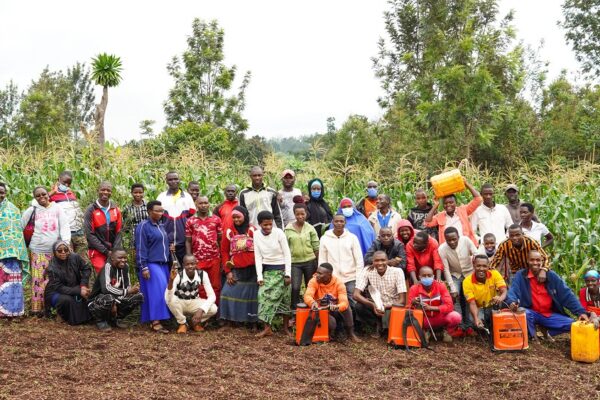
Youth Peace and Security in practice
"I realised that I can be the problem if I don't engage, if I don't take the first step. But I also understood that I can be the solution by bringing young people together." Idriss Ouattara, member of Association Génération Consciente de Côte d'Ivoire in Bocabo (GCCI)
In Côte d’Ivoire, Interpeace and local partner Indigo Côte d’Ivoire, aimed to return to the core principle of the YPS agenda by making youth the architects of peacebuilding in their communities; by supporting and working with existing youth-led initiatives and ensuring youth were responsible for the design and the implementation of key components of the project.
Youth in Côte d’Ivoire are commonly seen as key actors of political violence, being the victims of political instrumentalization and violent mobilization, particularly in electoral contexts. With the support and guidance of Interpeace and Indigo, youth groups carried out a Participatory Action Research (PAR) on the role of youth in political violence. From the results gathered, they proceeded to design new political violence prevention actions, putting YPS tools into practice in their context. Furthermore, the youth groups developed and implemented advocacy and communication campaigns based on these results.
This exchange reinforced the capacities of the youth groups to make their initiative on violence prevention and social cohesion more strategic, efficient, impactful, inclusive and sustainable. The publication: Putting the Youth, Peace and Security Agenda into practice: Youth as peace agents in Côte d’Ivoire captures key lessons and good practices from the initiative. It helps tackle the challenge of implementing the Youth, Peace and Security agenda, both nationally and locally, as well as provides a practical guide to governments, agencies, international organizations, NGOs and the private sector who wish to strengthen the participation of young people and their contribution to peace and security efforts.
Political and economic empowerment of youth collectives
“Undertaking a development project together has made us realise that our political diversity is more of an asset than an obstacle” Youth from Gasorwe Commune, Muyinga Province, Burundi
In Burundi, where youth make up the majority of the population (65%), Interpeace and local partner the Centre d’Alerte et Prevention des Conflits (CENAP), work with youth affiliated with different political parties to prevent violence and promote peaceful electoral processes. By engaging on trainings, debates and establishing collectives, the programme has witnessed youth crossing party lines to combat stereotyping and rumours, as well as has helped stop potential conflicts before they even start.
Moreover, young people have created joint projects and networks of their own initiative, like the creation of a Youth United Cooperative for Integral Development (CJUDI) which brings together young people from different political parties. The youth collectives work together on community and entrepreneurial initiatives, fostering social cohesion and building trust.
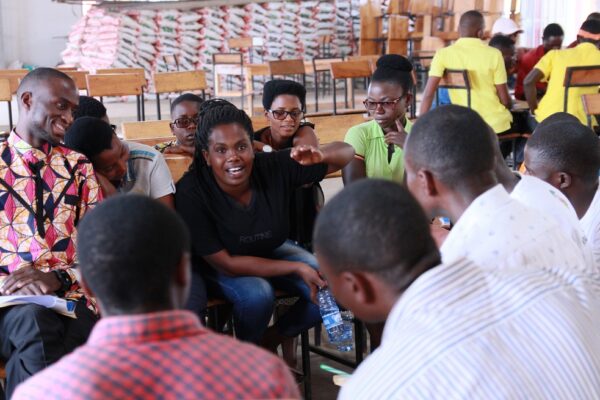
Strengthening peacebuilding infrastructure to improve resilience for peace
In Yemen, Interpeace has partnered with Youth Without Borders for Development (YWBOD), a Yemeni peacebuilding organization working on empowering youth to play significant and effective roles to bring about positive change. The project focuses on fostering the potential of young people to influence conflict resolution in positive and practical ways, and connecting this knowledge to decision-makers. It aims to inform and train a range of community-level actors to participate in local peacebuilding processes, as a way to strengthen resilience to peace, focusing on what works rather than on issues that create divisions.
Through participatory approaches, Interpeace and YWBOD are conducting capacity-building courses with Civil Society Organizations and Yemeni youth initiatives, such as Youth, Peace and Security Pact - Yemen. Youth initiatives are now conducting evidence-based research and implementing community resilience activities in Aden and Taiz, with young people having a central role in evidence collection.
Empowering youth in the Great Lakes region
Through a new regional initiative, Interpeace and local partners are providing young people in Burundi, DR Congo, Rwanda and Uganda with the skills and knowledge they need for a more effective leadership role in regional peace processes. The Great Lakes Youth Innovation Lab for Peace (YouthLab) is a 30-month initiative, launched in January 2021, implemented in partnership with Never Again Rwanda (NAR), the Pole Institute, the Centre d’Alerte et Prevention des Conflits (CENAP) and the Refugee Law Project.
According to one of the young people participating in the workshop: “Before this activity, we did not know each other. Now, we have just created a Whatsapp group to facilitate contacts between us.”
The YouthLab will provide a platform to provide young people in the Great Lakes with the necessary tools and capacities to engage in dialogue with policy makers, and to articulate their vision for peace in the region. The project also offers opportunities for horizontal learning and network building, as it is bringing together young people from across the region. Young people will not only learn but actively participate and lead initiatives that can contribute to governance, peacebuilding, and development initiatives at the local, national and regional levels.
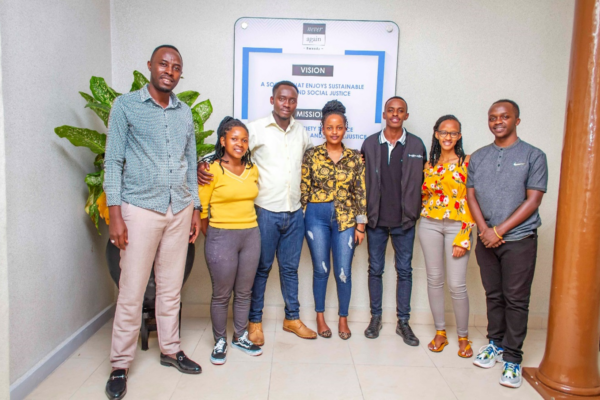
Outside the Box
"What if we found a way to consistently and regularly include more youth priorities, such as environmental protection and technology, in policy? Could we better anticipate future ecological disasters? Could we become even more resilient for peace?"
Anupah Makoond, Beneath the Wakashio Oil Spill: Exploring the linkages between youth marginalisation, environmental disaster, and resilience for peace in a small island state.
At the global level, Interpeace is proud to have facilitated the completion in 2021 of nine youth-authored or YPS-focused policy briefs. Each addresses issues of policy or practice that are important to young women and men, but which have not received sufficient attention in the YPS agenda or its implementation. The briefs address: youth, climate and conflict; alternative non-violent masculinities; the role of youth in transitional justice; assessments of YPS action plans and national YPS coalitions; expressions of youth resilience for peace; mental health and psychosocial services in the YPS arena; youth-centered DDR processes; and the dangers of securitisation of YPS agenda. A dedicated webpage and platform have been launched on the Interpeace website: Outside the Box: Amplifying Youth voices and Views on YPS Policy and Practice.
The Interpeace Outside the Box Platform will soon feature new youth authored and YPS focused policy briefs and other forms of media, set to be published in 2022 and 2023.
























